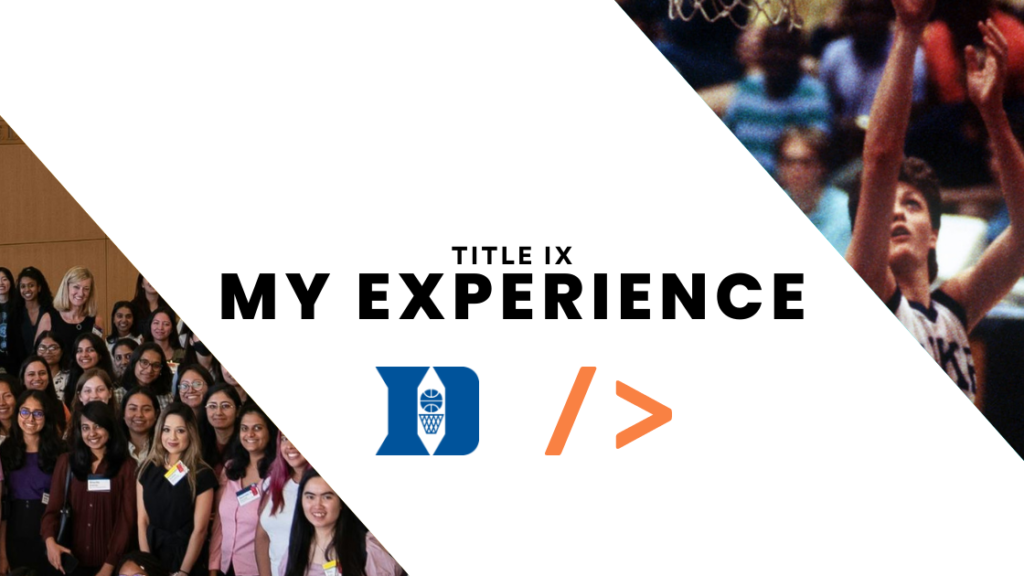
By Sue Harnett, Founder and President, Rewriting the Code
On June 23, 2022, we will celebrate the 50th anniversary of Title IX – a federal law that assures that all persons in the US are protected from discrimination based on gender in educational programs or activities that receive federal financial assistance. Although Title IX encompasses broad intent, people often associate it with women’s sports.
I am a direct beneficiary of Title IX. Over 200 Division I college coaches offered me full-scholarships to matriculate and play basketball at their respective institutions. These offers were a direct result of Title IX and were a dream come true. I, ultimately, chose Duke University for the opportunities to continue to challenge myself academically and athletically.
Female student-athletes experienced multiple positive gains due to the equity requirements of Title IX. During the first ten years following the inception of the law Billie Jean King launched the Women’s Sports Foundation, Ann Myers became the first 4-year athletic scholarship recipient at UCLA, and the NCAA created 10 Division I women’s national championships. The number of girls playing high school sports increased from less than 300,000 and 8% of boys’ participation levels in 1971 to 3.4 million and 43% during the 2018-2019 academic year.
But, lately, I have been contemplating Title IX through an educational program lens. As the founder and president of Rewriting the Code (RTC) – a nonprofit corporation focused on supporting college women in tech – I know that while many college women take introductory computer science courses, they have accounted for less than 20% of the computer science graduates for the past 16 years.
While the equity impact of Title IX can be seen in the increase of women student-athletes (as well as the downstream impact of girls’ participation in sport), the representation of college computing degrees awarded to women falls short. While women have equal opportunity to participate in computing coursework at their respective colleges and universities, they report significant challenges, including a lack of belonging and community in tech-related degree programs, scarcity of female role models, implicit bias, and financial hardship. We must question whether undergraduate computer science and engineering departments should proactively support women in an effort to increase gender representation in computing. Sixteen years is enough time to wait for more equitable outcomes without adopting a strategy to alter the pattern.
Rewriting the Code’s almost 6-year model of aggregating and supporting college women in computing across the US (and now across 80 countries), provides students with a community of college women in tech along with career exploration, mentorship, educational support, tech recruiting skills and events, and now financial support.
In an important step, Rewriting the Code launched the RTC Women in Tech Fund, in partnership with the Last Mile Education Fund. This fund addresses financial gaps that inhibit progress for RTC members from low-income families, with a focus on first generation college students and those from historically marginalized groups. Gaps in financial support for low-income students are a significant pain point, with less than 20% of students from the bottom two income quartiles earning a degree within 6 years of starting college. When it comes to tech talent, this is an unacceptable failure rate. RTC invites tech companies, philanthropic organizations, and individuals to join in investing in this high potential talent. Goldman Sachs recently provided a $1.5M grant to kickstart the Fund.
Title IX has assisted in addressing discrimination across many educational programs and activities, yet 50 years later, I believe it is time to focus on gender equity in tech – one of the fastest growing and most lucrative employment sectors – by addressing the systemic issues that continue to hold promising women back.
In the meantime, Rewriting the Code will continue to support, uplift and inspire the next generation of female leaders until we reach a level playing field and are no longer needed to do this work. There would be no better outcome than closing this business due to lack of need. If you are interested in learning more about how you can support and engage with our growing community of 15,000+ women in tech, let’s start a conversation.